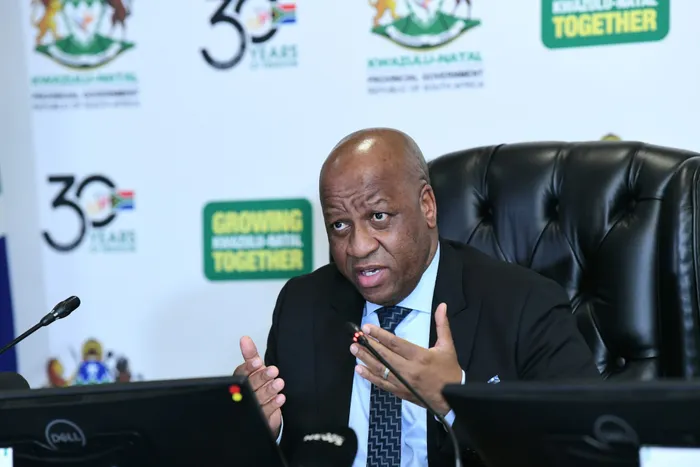Premier Thamsanqa Ntuli’s first 100 days: financial struggles and future solutions for KZN

KwaZulu-Natal Premier Thami Ntuli. Picture: Supplied
Durban — While KwaZulu-Natal Premier Thamsanqa Ntuli painted a grim picture of the province's finances, economists said focusing on stopping corruption and wastage would free up funds for the 7th administration.
Ntuli was addressing the media on his 100 days in office, on Tuesday.
He said the provincial government was facing headwinds regarding public finance management wherein the province’s cashflow projections must be managed closely and remove wastage.
“The 6th Administration had tried not to slip into an overdraft position at the end of the 2023/24 financial year, however, service providers are owed R10 billion and this will require an average of R150 million budget cuts over the next seven years, starting from 2025/2026 financial year to have a positive cash flow. We entered the 2024/2025 financial year with a R5.5bn as accruals, payable in the current cash flow, that is putting pressure on the fiscus in this current period.
“As the Government of Provincial Unity, we inherited expenses of the 2023/24 financial year that should be paid using the 2024/25 financial year budget. KwaZulu-Natal Provincial Government has had a declining contribution to the economic sector of 1,5% with a net impact on future growth and ability to attract private investment,” Ntuli said.
He added that the province ended the 2023/2024 financial year with a net overspend position by R839 million and it was anticipated that KwaZulu-Natal could overspend by R9.7bn.
The 2024/25 financial year shows that departments budgeted a 4.5% increase in their baseline costs, however, the wage agreement settled was for 4.7%, with a two-percentage points difference, he said – describing this expenditure item as a run-away target.
“The KZN Provincial Government has limited financial resources, meaning that we will not do everything that was promised within the anticipated timeframe, however, we will ensure that we improve integration at planning and implementation so that we use resources in a smart way,” Ntuli said.
However, KZN-based economist Professor Bonke Dumisa said that if the 7th administration could focus on stopping corruption it would save a lot of money which would be available to fund projects.
Dumisa said: “If they (the KZN government) can focus on reducing corruption, money will be available. These things which they want to achieve for the province need money and unfortunately, there is no money. Without it, very little can be done.”
KZN’s financial situation was nothing unexpected.
“It’s not peculiar to KZN. In the Free State and the Eastern Cape, it might be worse. It’s the same song all over the country.”
He added that it had nothing to do with any political party, but it was caused by low economic growth.
He said the current economic situation requires everyone to roll up their sleeves and contribute towards job creation.
“In SA we seem to be having more babies than the amount of productivity we are giving to the country’s economy. We seem to be uncaring about the environment we are bringing babies to. This situation may be worsened by the porous borders.
“The United States of America is thriving because small enterprises are creating jobs, whereas South Africans don’t want to. Instead, people want to know what the government is going to give them if they create employment opportunities - which is bad because everywhere in the world, the government makes bad employers,” Dumisa said.
Dumisa added that with the South African government sitting with a R6 trillion debt, the country cannot afford to settle at more than the budgeted percentage in salary hikes. He said this should not only apply to lower-paid employees - senior executives also need to stop giving themselves excessive performance bonuses.
The provincial government listed its priorities as inclusive economic growth and job creation; reducing poverty and tackling the high cost of living; and building a capable, ethical and developmental state.
Ntuli said they have committed to implementing revenue enhancement, wherein all departments should look at ways of improving their own revenue raising and collections, to increase the funds available for the priority service delivery programme. However, Dumisa said this would not work because lower-paid workers were really struggling with the cost of living, and many people were stealing electricity.
Dawie Roodt, Chief Economist at the Efficient Group said for the province to turn the tide, it must bring efficiency back and stop wastage.
“What can turn the tide is the efficient, much-better-run province, we need to stop wastage, we need to stop the corruption and we need a clean government. We just need to be draconian about implementing this,” Roodt said.
He said KZN was not the only province suffering from these problems – the national government is included.
“The only thing that the province needs is economic growth. Once the economy grows, everyone will benefit. More jobs will be created, more taxes will be available, wealth will be created and everything that goes with that.
“Unfortunately what happens is that politicians start emphasising things like – the “so-called create jobs”, while entrepreneurs do not necessarily invest in those kinds of projects. Entrepreneurs want to invest in projects that are profitable and if you don’t give them that kind of project, then they are not interested in creating jobs. The result of profitable projects is more business, more economic growth and more jobs,” Roodt said.
He said the emphasis on jobs is incorrect and would not lead to economic growth and it will be the poor and the unemployed who will be affected the most.
WhatsApp your views on this story to 071 485 7995.
Daily News